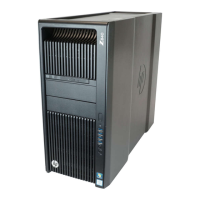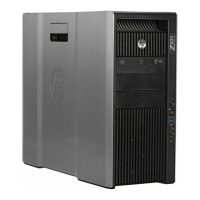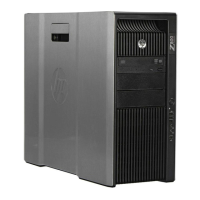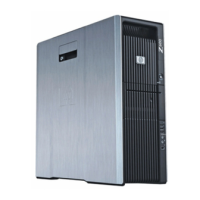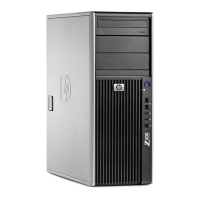Do you have a question about the HP Z840 Workstation Series and is the answer not in the manual?
Details the components of the HP Z440 Workstation, including front panel, rear panel, and chassis.
Details the components of the HP Z640 Workstation, including front panel, rear panel, and chassis.
Details the components of the HP Z840 Workstation, including front panel, rear panel, and chassis.
Lists environmental operating and non-operating specifications for HP Workstations, including temperature, humidity, and shock.
Provides guidelines for ensuring proper ventilation and airflow for workstation operation to maintain optimal performance.
Explains power management features like ERP compliance mode, Hyper-Threading, Turbo Boost, and BIOS settings.
Details the functions and menu options of the Computer Setup (F10) Utility for configuring system settings and security.
Summarizes capabilities, features, and key components for managing workstations, including software updates and security.
Highlights safety warnings and cautions related to handling components, electrical shock, and lifting equipment.
Outlines tools and software requirements and provides information on preventing Electrostatic Discharge (ESD) damage.
Encourages customers to recycle used electronic hardware, print cartridges, and rechargeable batteries.
Provides guidelines and warnings for replacing the computer's real-time clock battery.
Details proper routing and handling of internal cables for workstation operation and component installation.
Offers cautions for removing and replacing the processor and its heatsink, including thermal compound application.
Identifies and describes expansion card slots and provides card configuration information and restrictions.
Provides handling, removal, and installation tips for hard drives and optical drives, including cabling scenarios.
Details supported DIMM configurations, BIOS errors, and guidelines for installing memory modules.
Lists power supply specifications and outlines procedures for testing the power supply unit using its built-in self-test.
Provides guidance on replacing the system board, including noting cable connections and following cable management practices.
Guides on calling support, locating ID labels, warranty information, and general diagnosis guidelines.
Details HP's online support, troubleshooting checklist, and tools for resolving system issues.
Provides solutions for common problems like frozen systems, incorrect date/time, and performance issues.
Explains diagnostic LED codes, color definitions, and POST error messages to aid in problem diagnosis.
Describes the possibilities for setting up setup and power-on passwords using the Computer Setup (F10) Utility.
Details the procedure to disable password features and clear power-on and setup passwords by resetting a jumper.
Explains how to clear and reset the CMOS using the CMOS button or Computer Setup (F10) Utility to restore factory defaults.
Discusses HP's support for different amounts of RAM and how total memory is listed for various workstations.
Covers built-in audio hardware, ALSA drivers, and audio functionality over HDMI and DisplayPort.
Mentions integrated network interface controllers and optional NICs supported by HP workstations for Linux.
Explains Intel's HTT technology and how to enable it in Computer Setup for improved processor performance.
Recommends NVIDIA drivers for optimal results on Linux systems and provides information on installation.
Recommends AMD graphics drivers for best results on Linux and details driver installation and customization commands.
Lists the maximum number of hard drives supported on HP workstations based on RAID configuration and controllers.
Describes supported RAID configurations (RAID 0, 1, 5, 10, 1E) and their associated controllers and descriptions.
Explains how to set up SATA RAID volumes using Intel Rapid Storage Technology enterprise (RSTe) and configure system BIOS.
Provides step-by-step instructions for creating RAID volumes using the Intel utility.
Details how to set up SATA or SAS RAID arrays using LSI Logic Configuration Utility for specific controllers.
Explains how to set up SATA or SAS RAID arrays using the LSI Logic Configuration Utility for the MegaRAID controller.
Discusses software RAID considerations specific to Linux, including advantages, disadvantages, and performance.
Lists designators, names on board, and components for HP Z440 and Z640 workstation system boards.
Lists designators, names on board, and components for HP Z840 Workstation system boards.
Confirms volatile and nonvolatile memory in the Z440 workstation and provides steps for clearing memory.
Confirms volatile and nonvolatile memory in the Z640 workstation and provides steps for clearing memory.
Confirms volatile and nonvolatile memory in the Z840 workstation and provides steps for clearing memory.
| Chipset | Intel C612 |
|---|---|
| Memory Slots | 16 DIMM slots |
| Processor | Intel Xeon E5-2600 v3/v4 series |
| Storage | Supports SATA, SAS, and SSD |
| Graphics | NVIDIA Quadro and AMD FirePro options |
| Expansion Slots | 7 PCIe slots |
| Power Supply | 1125W 90% efficient |
| Operating System | Windows 10 Pro 64, Red Hat Enterprise Linux, SUSE Linux Enterprise Desktop |
| Ports | USB 3.0, USB 2.0 |
